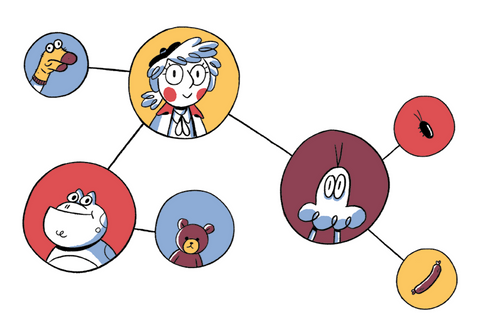You can run a business without any leadership accountability. But not for long!
You see, accountability is vital for a positive working environment. It’s all well and good expecting accountability from your employees, but if you don’t show any yourself… well, there are two outcomes:
- Your team will stop bothering with it, too.
- Your team will continue being accountable, and rapidly come to resent you.
Which is worse… an unmotivated team, or no team at all?
Fortunately, you don’t have to make that decision! There is a short list of trademark behaviours that ooze accountability, and plenty of ways to build your skills in this area.
But first… a little background.
What is leadership accountability?
You don’t have to look far to find claims that ‘leadership accountability is owning up to your mistakes’. And yes, that’s a trademark accountability behaviour - in fact, it’s top of our list. But it’s not the only requirement.
Accountability is owning your own responsibilities, decisions, actions and outcomes. It’s so much more than putting your hand up and saying “I got it wrong”. In fact, sometimes it’s more like putting your hand up and saying “I got it right!”.
Accountability means accepting and owning your role in the workplace. If something is in your job spec, you either do it or explain why you won’t/can’t/haven’t. And that doesn’t have to be a bad thing - sometimes, there’s a better way, or unforeseen circumstances arise. It just means you don’t point the finger at others.
As a leader, this can be a tricky task. Sometimes, things you oversee will fail due to something done (or not) by someone on your team. So where do you draw the line? How do you untangle how much of the blame lies at your feet due to lack of support, for example?
Because, let’s not forget, it’s also crucially important for your team to have their own accountability as individuals. It’s great for motivation and morale. That renewed vigour with which people attack their work after receiving credit for an achievement? You don’t get that without accountability.
We can’t give you a flowchart that helps you apportion accountability. But we can teach you how to recognise and nurture the qualities it takes to work it out for yourself.
Sometimes, leadership accountability means saying you were wrong
It can be uncomfortable to do this; and when no one has asked, it can feel unnecessary to offer such information! Far from making you look weak; it makes you brave. There is so much power in accepting responsibility for something less than perfect.
First, it allows you to move on to thinking about a solution, and how to prevent it from happening again. But second, it shows your team that the outcome for behaving with accountability is always constructive and not something to be feared.
Look for opportunities to share moments where you wish you had done better, whether it’s through small stories or telling people how you learned something they are impressed by. And when there’s a retrospective workshop or other milestone discussion, discuss what you’ll do better next time, too.
Ask your team to let you know what they need from you, and mean it! Try suggesting some things they might want: “Over the next period, does anyone feel like they need more support from me, or less interference?”. They may not wish to speak up in front of everyone, but tell them your door and inbox are always open and you’d be pleased to hear from them.
Leadership accountability requires communication skills
Beyond asking for feedback and asking your team what they need from you, general communication skills go a long way towards encouraging accountability.
As well as communicating your own mistakes, dealing sensitively with your team sharing their own is a tricky but important skill. If you get it right, you’ll see people come to you for advice before they fail; a powerful way to promote success! And if things do go pear-shaped, try some of the following:
- Sympathy: “I know how disappointed you must be after you worked so hard on that. Let’s look at the lessons learned and devise some new processes to avoid that in future.”
- Gratitude: “Thank you for sharing that update and taking responsibility. It’s not easy when things go wrong, I appreciate that”.
- Reassurance: “Don’t let your worry about that affect your wellbeing. You did your best, sometimes things don’t work out the way we want them to.”
- Empathy: “I know how disheartening it is when things don’t work out. When I was on X project, I put a lot of effort into Y and that didn’t go according to plan, either.”
Bear in mind, these responses all assume that your employee did try their best and that the outcome was not the result of negligence!
Delegating work helps you and your team practise accountability
Many leaders hold the saying “If you want something done properly, do it yourself” close to their heart. But that’s not the foundation of a high-performance team!
In How to encourage a culture of employee accountability we talk about how you can ensure you have a team that’s willing and able to take responsibility for achieving their own objectives. Things like hiring people you trust - and then trusting them!
One of the best ways to show that you trust people is through delegation. There are lots of ways you can do this. First, take a look at the tasks on your to-do list. Do any of them fall into an area of specialism that you have hired someone for? If so, give them some or all of the responsibility for this task.
Second, try the Eisenhower Matrix approach, where you rank your tasks according to how urgent and important they are. Anything that’s important but not urgent is a great candidate for delegation! Read more in How to delegate tasks to your team.
Remember, mastery and autonomy are powerful motivators. Giving away some of your responsibility is not only a kindness to yourself, but also your team!
How to develop your leadership accountability skills
If you’d like to continue to flex your accountability muscles, try some of the following activities.
Mentoring
Receiving mentoring is a smart way to develop better accountability. The American Society of Training and Development found that the chance of someone achieving a goal leaps from 65% to 95% when they commit to it with a specific person and have an appointment in place to follow up on it, rather than just telling someone they will do it.
Rethink how you classify ‘success’ from your team
When you look for examples of great performance, look beyond the tasks and processes that your team carries out. Instead, set expectations, priorities and deadlines - then judge the outcomes.
It can be a steep learning curve at times, but leadership accountability is one of the most powerful tools in any organisation’s toolkit.









